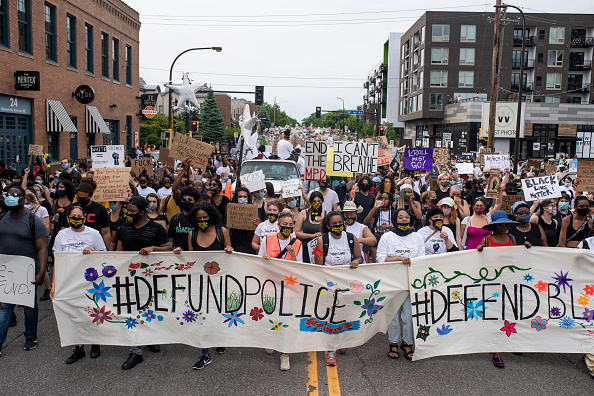Defund the Police!
It’s certainly an eye-catching, provocative slogan, widely shouted, waved on signs and painted on streets during the eruption of protests since the killing of George Floyd two weeks ago in Minneapolis.
On Monday afternoon, Joe Biden’s campaign said that the Democratic presidential contender does not believe “defunding” is the right path, The Hill reports.
The campaign said Biden “supports the urgent need for reform — including funding for public schools, summer programs, and mental health and substance abuse treatment separate from funding for policing — so that officers can focus on the job of policing.”
Interestingly that sounds an awful lot like what the slogan-shouters say it means to them. But Biden is a politician with his eye on November, so he’s leery of shouting along.
Complicated? Yes. But to the point: what does it really mean?
Good slogans must be short, easy to remember and instantly clear in their meaning. “Black Lives Matter” is an excellent example.
But “Defund the Police” fails the clarity standard, as demonstrated by the recent flood of interviews, articles and pundit pronouncements attempting to explain what protesters mean by those three simple words.
In other words, it shouldn’t require explanation, yet it does.
Even the longtime civil rights activist and sometime provocateur Rev. Al Sharpton, interviewed on MSNBC’s Morning Joe, said: “The slogan may be misleading without interpretation.”
Many on the right take it to mean disbanding police forces. As Donald Trump tweeted on Monday in his visually bellowing style:
“LAW & ORDER, NOT DEFUND AND ABOLISH THE POLICE.”
Other Americans, whatever their political leanings, are puzzled.
Who, they wonder, would fight ordinary crime (from vandalism to murder), respond to domestic violence and support firefighters and other emergency workers, if police forces are abolished?
So let’s join the growing crowd of explainers, beginning with this:
No one is calling for local police forces to be eliminated, except possibly a tiny minority of those on the protesters’ extreme left and an equally small number of ivory-tower academics.
“Defunding the police absolutely does not mean that we eliminate all cops,” said John Oliver on HBO’s Last Week Tonight. “Instead, it’s about moving away from a narrow conception of public safety that relies on policing and punishment and investing in a community’s actual safety net.”
That’s good as far as it goes, yet Oliver does not address the key, vital word in the slogan: Defund. That means spending fewer dollars on policing, which implies reducing the amount and kind of service expected of officers on the street.
As Washington Post op-ed writer Christy Lopez put it on Monday:
“Defunding the police means shrinking the scope of police responsibilities and shifting most of what government does to keep us safe to entities that are better equipped to meet that need. It means investing more in mental-health care and housing, and expanding the use of community mediation and violence interruption programs.”
“A three-word slogan is not a detailed policy agenda, and not everyone using the slogan agrees on the details,” says Vox. “The basic idea, though, is less that policing budgets should be literally zeroed out than that there should be a massive restructuring of public spending priorities.”
Rolling Stone quotes Lynda Garcia, policing campaign director at the Leadership Conference on Civil and Human Rights: “A lot of what we advocate for is investment in community services — education, medical access… You can call it ‘defunding,’ but it’s just about directing or balancing the budget in a different way.”
In the end, it’s a shame that so short a slogan requires so much explaining.



